Research Proposal: Evaluating Care Professionals & Palliative Care
VerifiedAdded on 2023/04/03
|13
|3197
|500
Report
AI Summary
This research proposal explores the perceptions of care professionals towards terminally ill patients and the essence of palliative care. It highlights the increasing prevalence of terminal illnesses in Australia and the importance of palliative care in improving the quality of life for patients and their families. The proposal addresses the problem of inconsistent understanding and application of palliative care among care professionals, leading to potential barriers in access and quality of care. It uses grounded theory as a conceptual framework and qualitative research methods, including semi-structured interviews, to gather data and evaluate the perceptions of nurses working in palliative care units. The study aims to contribute to improving education, awareness, and referral rates for palliative care services, ultimately enhancing the well-being of critically ill patients.

Running head: RESEARCH PROPOSAL
RESEARCH PROPOSAL
Name of the Student:
Name of the University:
Author Note:
RESEARCH PROPOSAL
Name of the Student:
Name of the University:
Author Note:
Paraphrase This Document
Need a fresh take? Get an instant paraphrase of this document with our AI Paraphraser
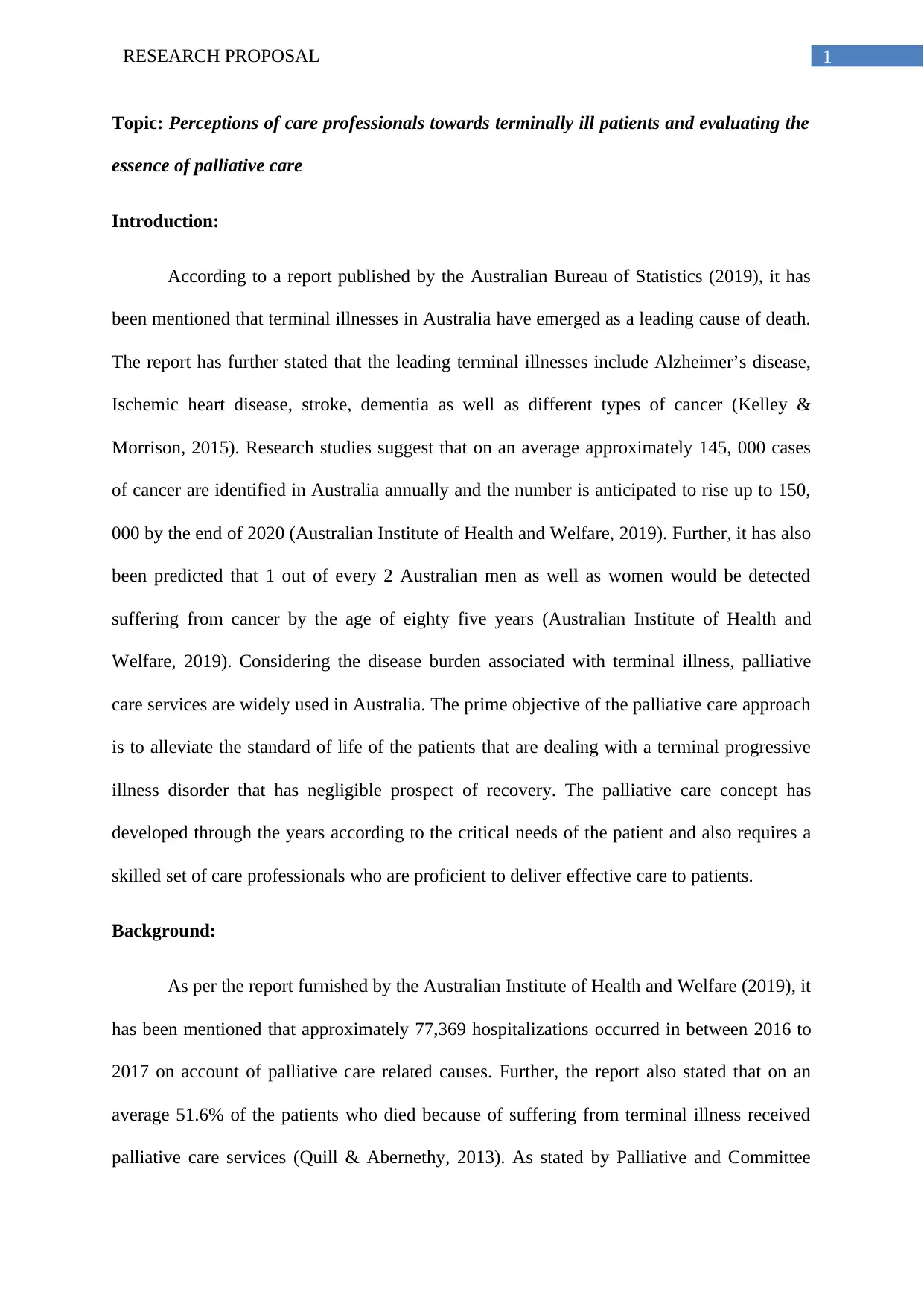
1RESEARCH PROPOSAL
Topic: Perceptions of care professionals towards terminally ill patients and evaluating the
essence of palliative care
Introduction:
According to a report published by the Australian Bureau of Statistics (2019), it has
been mentioned that terminal illnesses in Australia have emerged as a leading cause of death.
The report has further stated that the leading terminal illnesses include Alzheimer’s disease,
Ischemic heart disease, stroke, dementia as well as different types of cancer (Kelley &
Morrison, 2015). Research studies suggest that on an average approximately 145, 000 cases
of cancer are identified in Australia annually and the number is anticipated to rise up to 150,
000 by the end of 2020 (Australian Institute of Health and Welfare, 2019). Further, it has also
been predicted that 1 out of every 2 Australian men as well as women would be detected
suffering from cancer by the age of eighty five years (Australian Institute of Health and
Welfare, 2019). Considering the disease burden associated with terminal illness, palliative
care services are widely used in Australia. The prime objective of the palliative care approach
is to alleviate the standard of life of the patients that are dealing with a terminal progressive
illness disorder that has negligible prospect of recovery. The palliative care concept has
developed through the years according to the critical needs of the patient and also requires a
skilled set of care professionals who are proficient to deliver effective care to patients.
Background:
As per the report furnished by the Australian Institute of Health and Welfare (2019), it
has been mentioned that approximately 77,369 hospitalizations occurred in between 2016 to
2017 on account of palliative care related causes. Further, the report also stated that on an
average 51.6% of the patients who died because of suffering from terminal illness received
palliative care services (Quill & Abernethy, 2013). As stated by Palliative and Committee
Topic: Perceptions of care professionals towards terminally ill patients and evaluating the
essence of palliative care
Introduction:
According to a report published by the Australian Bureau of Statistics (2019), it has
been mentioned that terminal illnesses in Australia have emerged as a leading cause of death.
The report has further stated that the leading terminal illnesses include Alzheimer’s disease,
Ischemic heart disease, stroke, dementia as well as different types of cancer (Kelley &
Morrison, 2015). Research studies suggest that on an average approximately 145, 000 cases
of cancer are identified in Australia annually and the number is anticipated to rise up to 150,
000 by the end of 2020 (Australian Institute of Health and Welfare, 2019). Further, it has also
been predicted that 1 out of every 2 Australian men as well as women would be detected
suffering from cancer by the age of eighty five years (Australian Institute of Health and
Welfare, 2019). Considering the disease burden associated with terminal illness, palliative
care services are widely used in Australia. The prime objective of the palliative care approach
is to alleviate the standard of life of the patients that are dealing with a terminal progressive
illness disorder that has negligible prospect of recovery. The palliative care concept has
developed through the years according to the critical needs of the patient and also requires a
skilled set of care professionals who are proficient to deliver effective care to patients.
Background:
As per the report furnished by the Australian Institute of Health and Welfare (2019), it
has been mentioned that approximately 77,369 hospitalizations occurred in between 2016 to
2017 on account of palliative care related causes. Further, the report also stated that on an
average 51.6% of the patients who died because of suffering from terminal illness received
palliative care services (Quill & Abernethy, 2013). As stated by Palliative and Committee
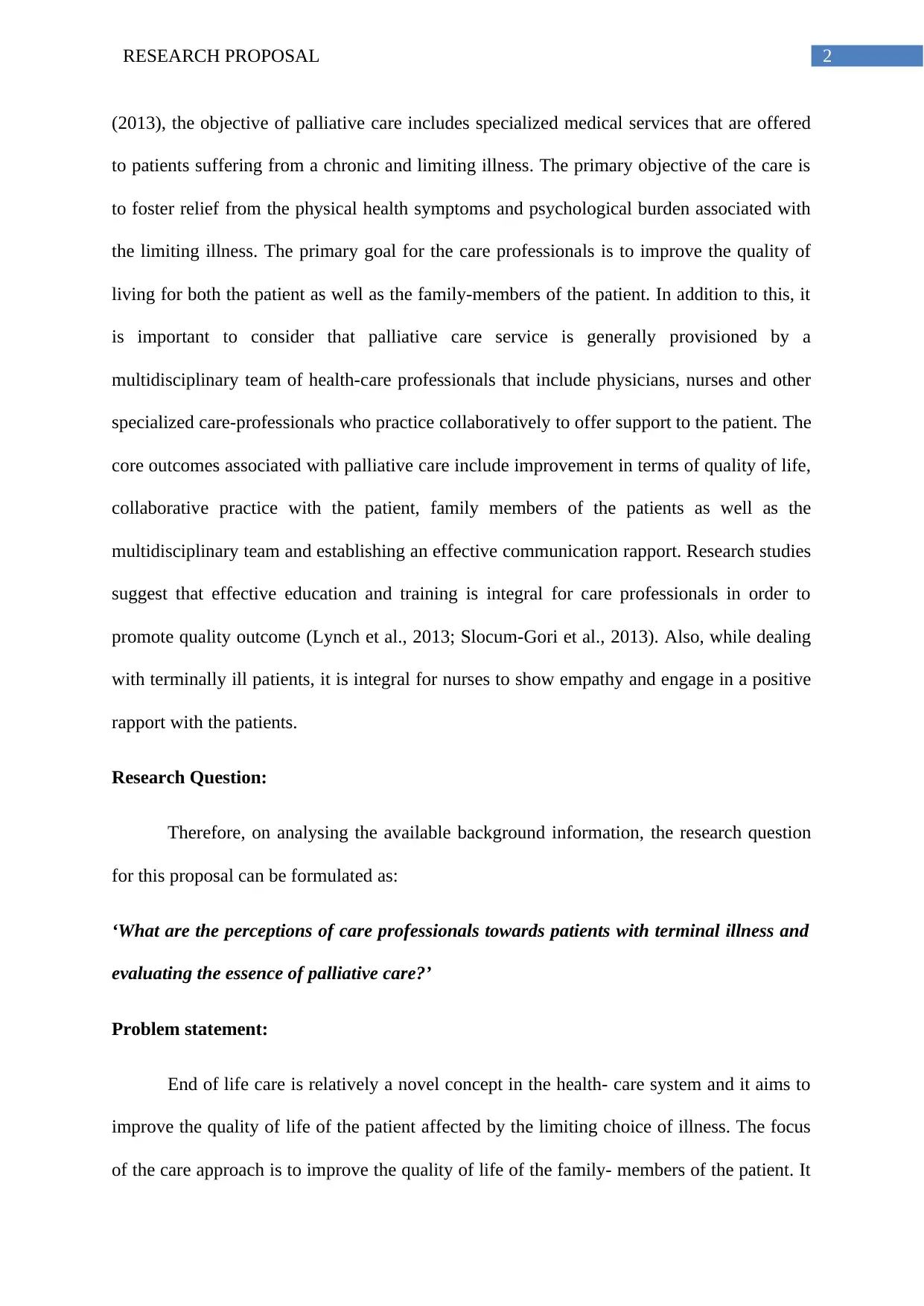
2RESEARCH PROPOSAL
(2013), the objective of palliative care includes specialized medical services that are offered
to patients suffering from a chronic and limiting illness. The primary objective of the care is
to foster relief from the physical health symptoms and psychological burden associated with
the limiting illness. The primary goal for the care professionals is to improve the quality of
living for both the patient as well as the family-members of the patient. In addition to this, it
is important to consider that palliative care service is generally provisioned by a
multidisciplinary team of health-care professionals that include physicians, nurses and other
specialized care-professionals who practice collaboratively to offer support to the patient. The
core outcomes associated with palliative care include improvement in terms of quality of life,
collaborative practice with the patient, family members of the patients as well as the
multidisciplinary team and establishing an effective communication rapport. Research studies
suggest that effective education and training is integral for care professionals in order to
promote quality outcome (Lynch et al., 2013; Slocum-Gori et al., 2013). Also, while dealing
with terminally ill patients, it is integral for nurses to show empathy and engage in a positive
rapport with the patients.
Research Question:
Therefore, on analysing the available background information, the research question
for this proposal can be formulated as:
‘What are the perceptions of care professionals towards patients with terminal illness and
evaluating the essence of palliative care?’
Problem statement:
End of life care is relatively a novel concept in the health- care system and it aims to
improve the quality of life of the patient affected by the limiting choice of illness. The focus
of the care approach is to improve the quality of life of the family- members of the patient. It
(2013), the objective of palliative care includes specialized medical services that are offered
to patients suffering from a chronic and limiting illness. The primary objective of the care is
to foster relief from the physical health symptoms and psychological burden associated with
the limiting illness. The primary goal for the care professionals is to improve the quality of
living for both the patient as well as the family-members of the patient. In addition to this, it
is important to consider that palliative care service is generally provisioned by a
multidisciplinary team of health-care professionals that include physicians, nurses and other
specialized care-professionals who practice collaboratively to offer support to the patient. The
core outcomes associated with palliative care include improvement in terms of quality of life,
collaborative practice with the patient, family members of the patients as well as the
multidisciplinary team and establishing an effective communication rapport. Research studies
suggest that effective education and training is integral for care professionals in order to
promote quality outcome (Lynch et al., 2013; Slocum-Gori et al., 2013). Also, while dealing
with terminally ill patients, it is integral for nurses to show empathy and engage in a positive
rapport with the patients.
Research Question:
Therefore, on analysing the available background information, the research question
for this proposal can be formulated as:
‘What are the perceptions of care professionals towards patients with terminal illness and
evaluating the essence of palliative care?’
Problem statement:
End of life care is relatively a novel concept in the health- care system and it aims to
improve the quality of life of the patient affected by the limiting choice of illness. The focus
of the care approach is to improve the quality of life of the family- members of the patient. It
⊘ This is a preview!⊘
Do you want full access?
Subscribe today to unlock all pages.

Trusted by 1+ million students worldwide
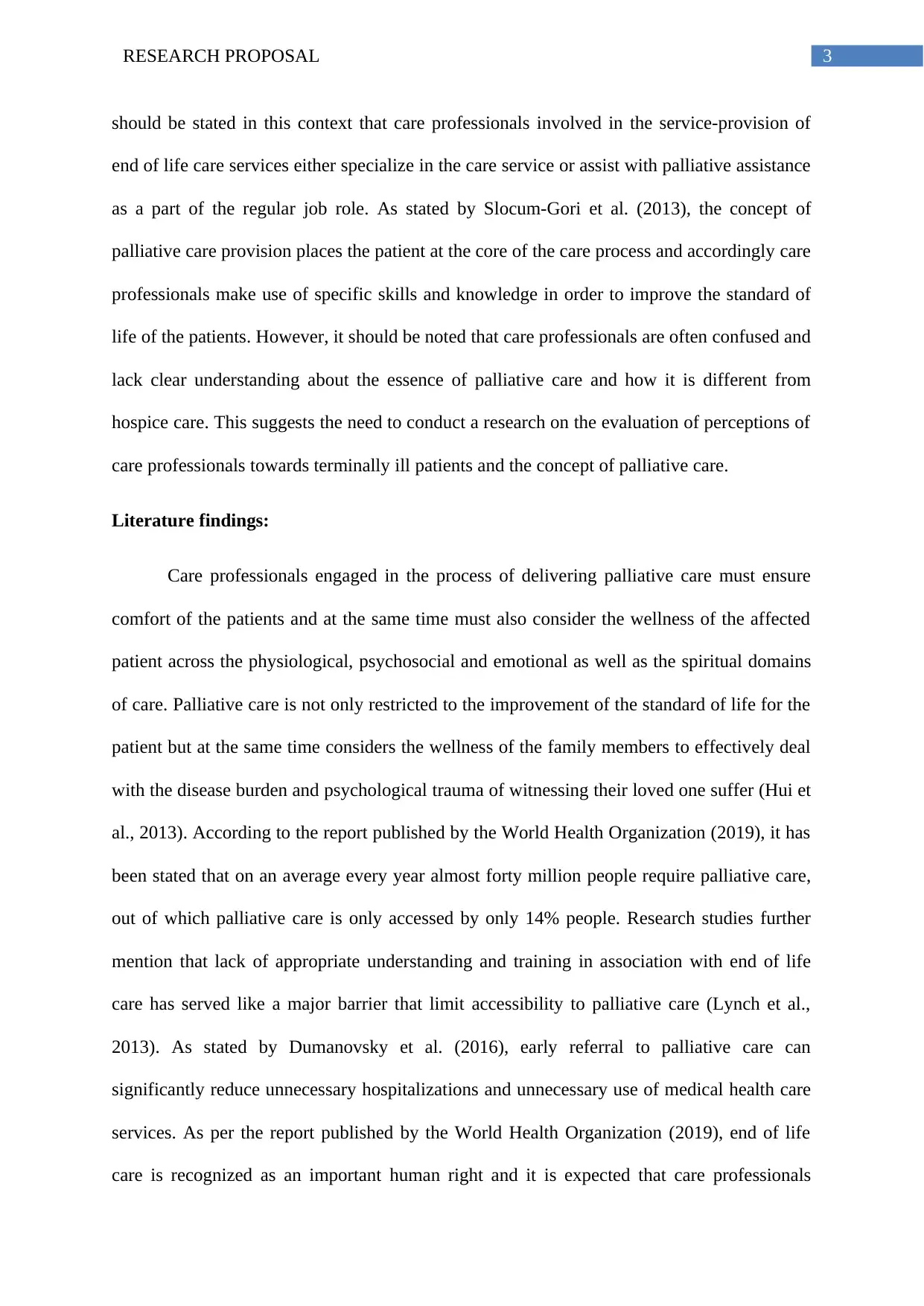
3RESEARCH PROPOSAL
should be stated in this context that care professionals involved in the service-provision of
end of life care services either specialize in the care service or assist with palliative assistance
as a part of the regular job role. As stated by Slocum-Gori et al. (2013), the concept of
palliative care provision places the patient at the core of the care process and accordingly care
professionals make use of specific skills and knowledge in order to improve the standard of
life of the patients. However, it should be noted that care professionals are often confused and
lack clear understanding about the essence of palliative care and how it is different from
hospice care. This suggests the need to conduct a research on the evaluation of perceptions of
care professionals towards terminally ill patients and the concept of palliative care.
Literature findings:
Care professionals engaged in the process of delivering palliative care must ensure
comfort of the patients and at the same time must also consider the wellness of the affected
patient across the physiological, psychosocial and emotional as well as the spiritual domains
of care. Palliative care is not only restricted to the improvement of the standard of life for the
patient but at the same time considers the wellness of the family members to effectively deal
with the disease burden and psychological trauma of witnessing their loved one suffer (Hui et
al., 2013). According to the report published by the World Health Organization (2019), it has
been stated that on an average every year almost forty million people require palliative care,
out of which palliative care is only accessed by only 14% people. Research studies further
mention that lack of appropriate understanding and training in association with end of life
care has served like a major barrier that limit accessibility to palliative care (Lynch et al.,
2013). As stated by Dumanovsky et al. (2016), early referral to palliative care can
significantly reduce unnecessary hospitalizations and unnecessary use of medical health care
services. As per the report published by the World Health Organization (2019), end of life
care is recognized as an important human right and it is expected that care professionals
should be stated in this context that care professionals involved in the service-provision of
end of life care services either specialize in the care service or assist with palliative assistance
as a part of the regular job role. As stated by Slocum-Gori et al. (2013), the concept of
palliative care provision places the patient at the core of the care process and accordingly care
professionals make use of specific skills and knowledge in order to improve the standard of
life of the patients. However, it should be noted that care professionals are often confused and
lack clear understanding about the essence of palliative care and how it is different from
hospice care. This suggests the need to conduct a research on the evaluation of perceptions of
care professionals towards terminally ill patients and the concept of palliative care.
Literature findings:
Care professionals engaged in the process of delivering palliative care must ensure
comfort of the patients and at the same time must also consider the wellness of the affected
patient across the physiological, psychosocial and emotional as well as the spiritual domains
of care. Palliative care is not only restricted to the improvement of the standard of life for the
patient but at the same time considers the wellness of the family members to effectively deal
with the disease burden and psychological trauma of witnessing their loved one suffer (Hui et
al., 2013). According to the report published by the World Health Organization (2019), it has
been stated that on an average every year almost forty million people require palliative care,
out of which palliative care is only accessed by only 14% people. Research studies further
mention that lack of appropriate understanding and training in association with end of life
care has served like a major barrier that limit accessibility to palliative care (Lynch et al.,
2013). As stated by Dumanovsky et al. (2016), early referral to palliative care can
significantly reduce unnecessary hospitalizations and unnecessary use of medical health care
services. As per the report published by the World Health Organization (2019), end of life
care is recognized as an important human right and it is expected that care professionals
Paraphrase This Document
Need a fresh take? Get an instant paraphrase of this document with our AI Paraphraser
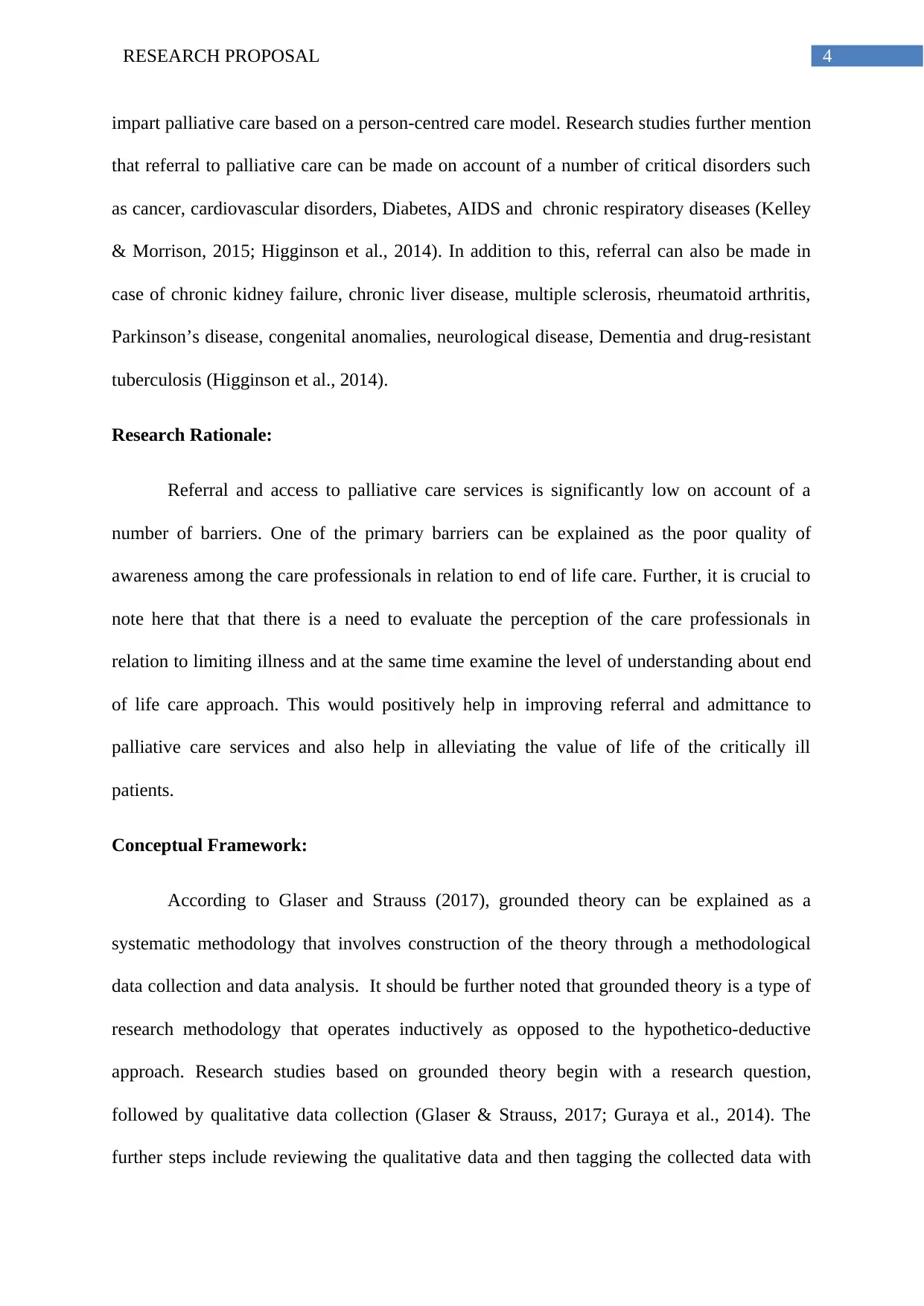
4RESEARCH PROPOSAL
impart palliative care based on a person-centred care model. Research studies further mention
that referral to palliative care can be made on account of a number of critical disorders such
as cancer, cardiovascular disorders, Diabetes, AIDS and chronic respiratory diseases (Kelley
& Morrison, 2015; Higginson et al., 2014). In addition to this, referral can also be made in
case of chronic kidney failure, chronic liver disease, multiple sclerosis, rheumatoid arthritis,
Parkinson’s disease, congenital anomalies, neurological disease, Dementia and drug-resistant
tuberculosis (Higginson et al., 2014).
Research Rationale:
Referral and access to palliative care services is significantly low on account of a
number of barriers. One of the primary barriers can be explained as the poor quality of
awareness among the care professionals in relation to end of life care. Further, it is crucial to
note here that that there is a need to evaluate the perception of the care professionals in
relation to limiting illness and at the same time examine the level of understanding about end
of life care approach. This would positively help in improving referral and admittance to
palliative care services and also help in alleviating the value of life of the critically ill
patients.
Conceptual Framework:
According to Glaser and Strauss (2017), grounded theory can be explained as a
systematic methodology that involves construction of the theory through a methodological
data collection and data analysis. It should be further noted that grounded theory is a type of
research methodology that operates inductively as opposed to the hypothetico-deductive
approach. Research studies based on grounded theory begin with a research question,
followed by qualitative data collection (Glaser & Strauss, 2017; Guraya et al., 2014). The
further steps include reviewing the qualitative data and then tagging the collected data with
impart palliative care based on a person-centred care model. Research studies further mention
that referral to palliative care can be made on account of a number of critical disorders such
as cancer, cardiovascular disorders, Diabetes, AIDS and chronic respiratory diseases (Kelley
& Morrison, 2015; Higginson et al., 2014). In addition to this, referral can also be made in
case of chronic kidney failure, chronic liver disease, multiple sclerosis, rheumatoid arthritis,
Parkinson’s disease, congenital anomalies, neurological disease, Dementia and drug-resistant
tuberculosis (Higginson et al., 2014).
Research Rationale:
Referral and access to palliative care services is significantly low on account of a
number of barriers. One of the primary barriers can be explained as the poor quality of
awareness among the care professionals in relation to end of life care. Further, it is crucial to
note here that that there is a need to evaluate the perception of the care professionals in
relation to limiting illness and at the same time examine the level of understanding about end
of life care approach. This would positively help in improving referral and admittance to
palliative care services and also help in alleviating the value of life of the critically ill
patients.
Conceptual Framework:
According to Glaser and Strauss (2017), grounded theory can be explained as a
systematic methodology that involves construction of the theory through a methodological
data collection and data analysis. It should be further noted that grounded theory is a type of
research methodology that operates inductively as opposed to the hypothetico-deductive
approach. Research studies based on grounded theory begin with a research question,
followed by qualitative data collection (Glaser & Strauss, 2017; Guraya et al., 2014). The
further steps include reviewing the qualitative data and then tagging the collected data with
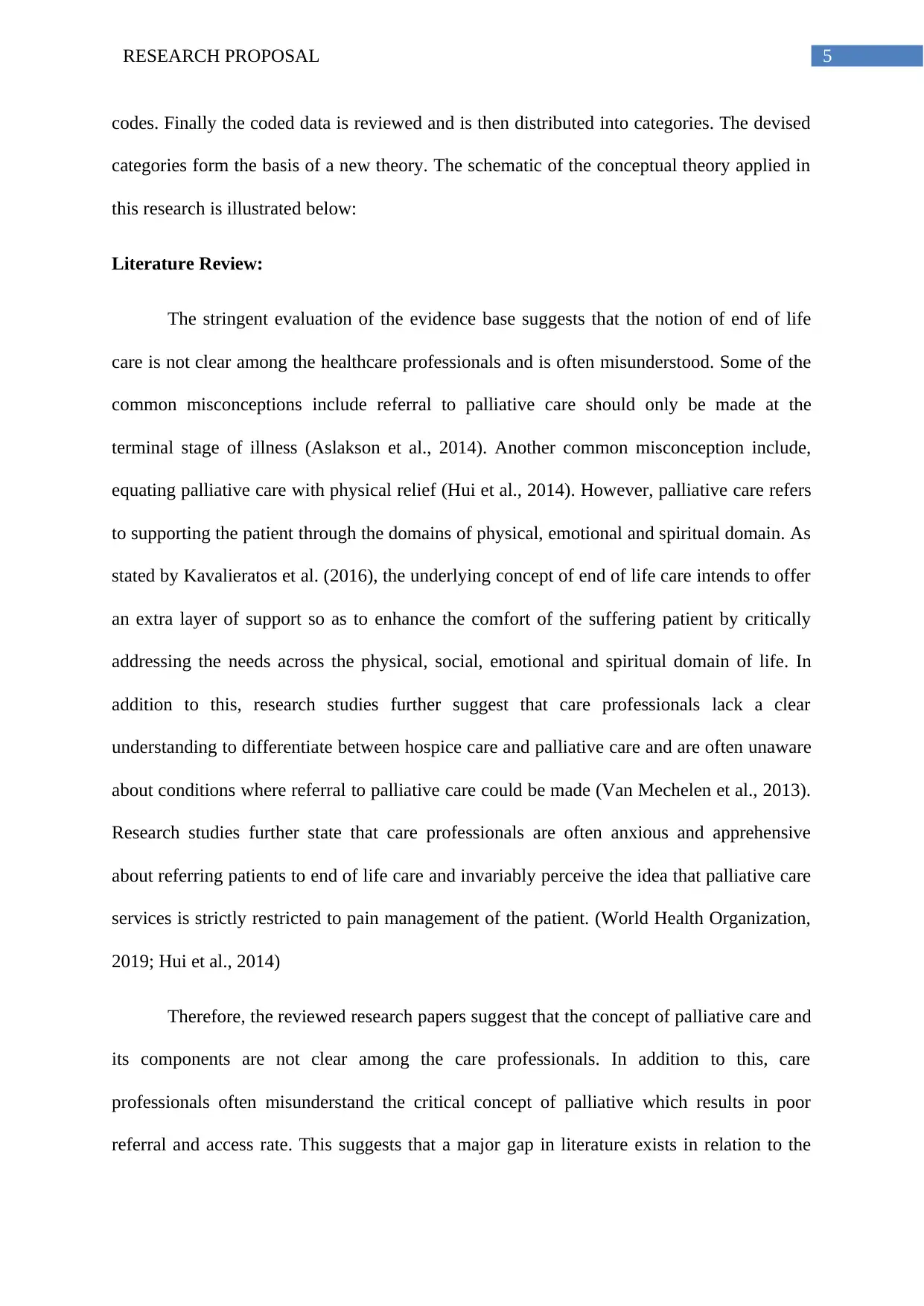
5RESEARCH PROPOSAL
codes. Finally the coded data is reviewed and is then distributed into categories. The devised
categories form the basis of a new theory. The schematic of the conceptual theory applied in
this research is illustrated below:
Literature Review:
The stringent evaluation of the evidence base suggests that the notion of end of life
care is not clear among the healthcare professionals and is often misunderstood. Some of the
common misconceptions include referral to palliative care should only be made at the
terminal stage of illness (Aslakson et al., 2014). Another common misconception include,
equating palliative care with physical relief (Hui et al., 2014). However, palliative care refers
to supporting the patient through the domains of physical, emotional and spiritual domain. As
stated by Kavalieratos et al. (2016), the underlying concept of end of life care intends to offer
an extra layer of support so as to enhance the comfort of the suffering patient by critically
addressing the needs across the physical, social, emotional and spiritual domain of life. In
addition to this, research studies further suggest that care professionals lack a clear
understanding to differentiate between hospice care and palliative care and are often unaware
about conditions where referral to palliative care could be made (Van Mechelen et al., 2013).
Research studies further state that care professionals are often anxious and apprehensive
about referring patients to end of life care and invariably perceive the idea that palliative care
services is strictly restricted to pain management of the patient. (World Health Organization,
2019; Hui et al., 2014)
Therefore, the reviewed research papers suggest that the concept of palliative care and
its components are not clear among the care professionals. In addition to this, care
professionals often misunderstand the critical concept of palliative which results in poor
referral and access rate. This suggests that a major gap in literature exists in relation to the
codes. Finally the coded data is reviewed and is then distributed into categories. The devised
categories form the basis of a new theory. The schematic of the conceptual theory applied in
this research is illustrated below:
Literature Review:
The stringent evaluation of the evidence base suggests that the notion of end of life
care is not clear among the healthcare professionals and is often misunderstood. Some of the
common misconceptions include referral to palliative care should only be made at the
terminal stage of illness (Aslakson et al., 2014). Another common misconception include,
equating palliative care with physical relief (Hui et al., 2014). However, palliative care refers
to supporting the patient through the domains of physical, emotional and spiritual domain. As
stated by Kavalieratos et al. (2016), the underlying concept of end of life care intends to offer
an extra layer of support so as to enhance the comfort of the suffering patient by critically
addressing the needs across the physical, social, emotional and spiritual domain of life. In
addition to this, research studies further suggest that care professionals lack a clear
understanding to differentiate between hospice care and palliative care and are often unaware
about conditions where referral to palliative care could be made (Van Mechelen et al., 2013).
Research studies further state that care professionals are often anxious and apprehensive
about referring patients to end of life care and invariably perceive the idea that palliative care
services is strictly restricted to pain management of the patient. (World Health Organization,
2019; Hui et al., 2014)
Therefore, the reviewed research papers suggest that the concept of palliative care and
its components are not clear among the care professionals. In addition to this, care
professionals often misunderstand the critical concept of palliative which results in poor
referral and access rate. This suggests that a major gap in literature exists in relation to the
⊘ This is a preview!⊘
Do you want full access?
Subscribe today to unlock all pages.

Trusted by 1+ million students worldwide
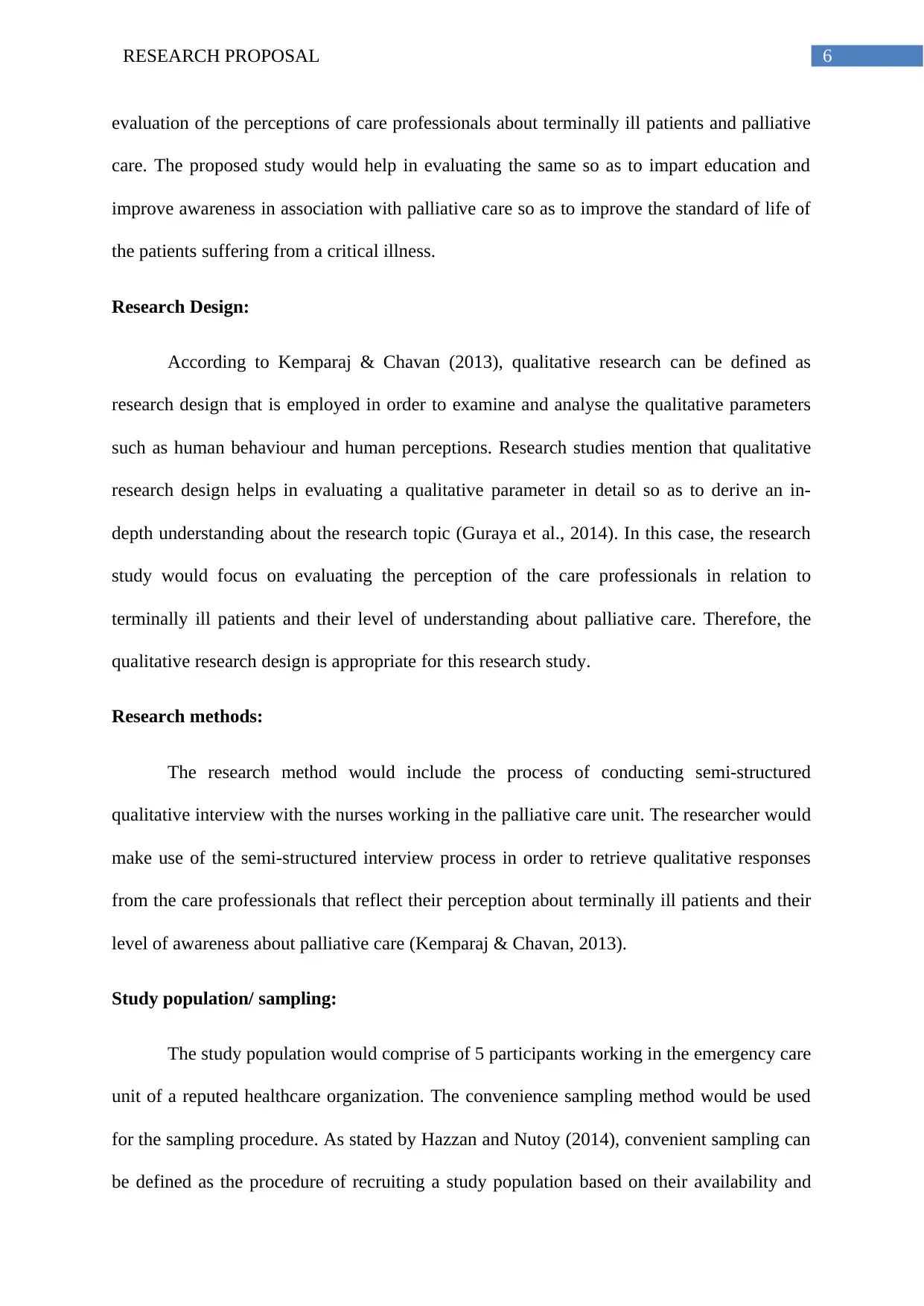
6RESEARCH PROPOSAL
evaluation of the perceptions of care professionals about terminally ill patients and palliative
care. The proposed study would help in evaluating the same so as to impart education and
improve awareness in association with palliative care so as to improve the standard of life of
the patients suffering from a critical illness.
Research Design:
According to Kemparaj & Chavan (2013), qualitative research can be defined as
research design that is employed in order to examine and analyse the qualitative parameters
such as human behaviour and human perceptions. Research studies mention that qualitative
research design helps in evaluating a qualitative parameter in detail so as to derive an in-
depth understanding about the research topic (Guraya et al., 2014). In this case, the research
study would focus on evaluating the perception of the care professionals in relation to
terminally ill patients and their level of understanding about palliative care. Therefore, the
qualitative research design is appropriate for this research study.
Research methods:
The research method would include the process of conducting semi-structured
qualitative interview with the nurses working in the palliative care unit. The researcher would
make use of the semi-structured interview process in order to retrieve qualitative responses
from the care professionals that reflect their perception about terminally ill patients and their
level of awareness about palliative care (Kemparaj & Chavan, 2013).
Study population/ sampling:
The study population would comprise of 5 participants working in the emergency care
unit of a reputed healthcare organization. The convenience sampling method would be used
for the sampling procedure. As stated by Hazzan and Nutoy (2014), convenient sampling can
be defined as the procedure of recruiting a study population based on their availability and
evaluation of the perceptions of care professionals about terminally ill patients and palliative
care. The proposed study would help in evaluating the same so as to impart education and
improve awareness in association with palliative care so as to improve the standard of life of
the patients suffering from a critical illness.
Research Design:
According to Kemparaj & Chavan (2013), qualitative research can be defined as
research design that is employed in order to examine and analyse the qualitative parameters
such as human behaviour and human perceptions. Research studies mention that qualitative
research design helps in evaluating a qualitative parameter in detail so as to derive an in-
depth understanding about the research topic (Guraya et al., 2014). In this case, the research
study would focus on evaluating the perception of the care professionals in relation to
terminally ill patients and their level of understanding about palliative care. Therefore, the
qualitative research design is appropriate for this research study.
Research methods:
The research method would include the process of conducting semi-structured
qualitative interview with the nurses working in the palliative care unit. The researcher would
make use of the semi-structured interview process in order to retrieve qualitative responses
from the care professionals that reflect their perception about terminally ill patients and their
level of awareness about palliative care (Kemparaj & Chavan, 2013).
Study population/ sampling:
The study population would comprise of 5 participants working in the emergency care
unit of a reputed healthcare organization. The convenience sampling method would be used
for the sampling procedure. As stated by Hazzan and Nutoy (2014), convenient sampling can
be defined as the procedure of recruiting a study population based on their availability and
Paraphrase This Document
Need a fresh take? Get an instant paraphrase of this document with our AI Paraphraser
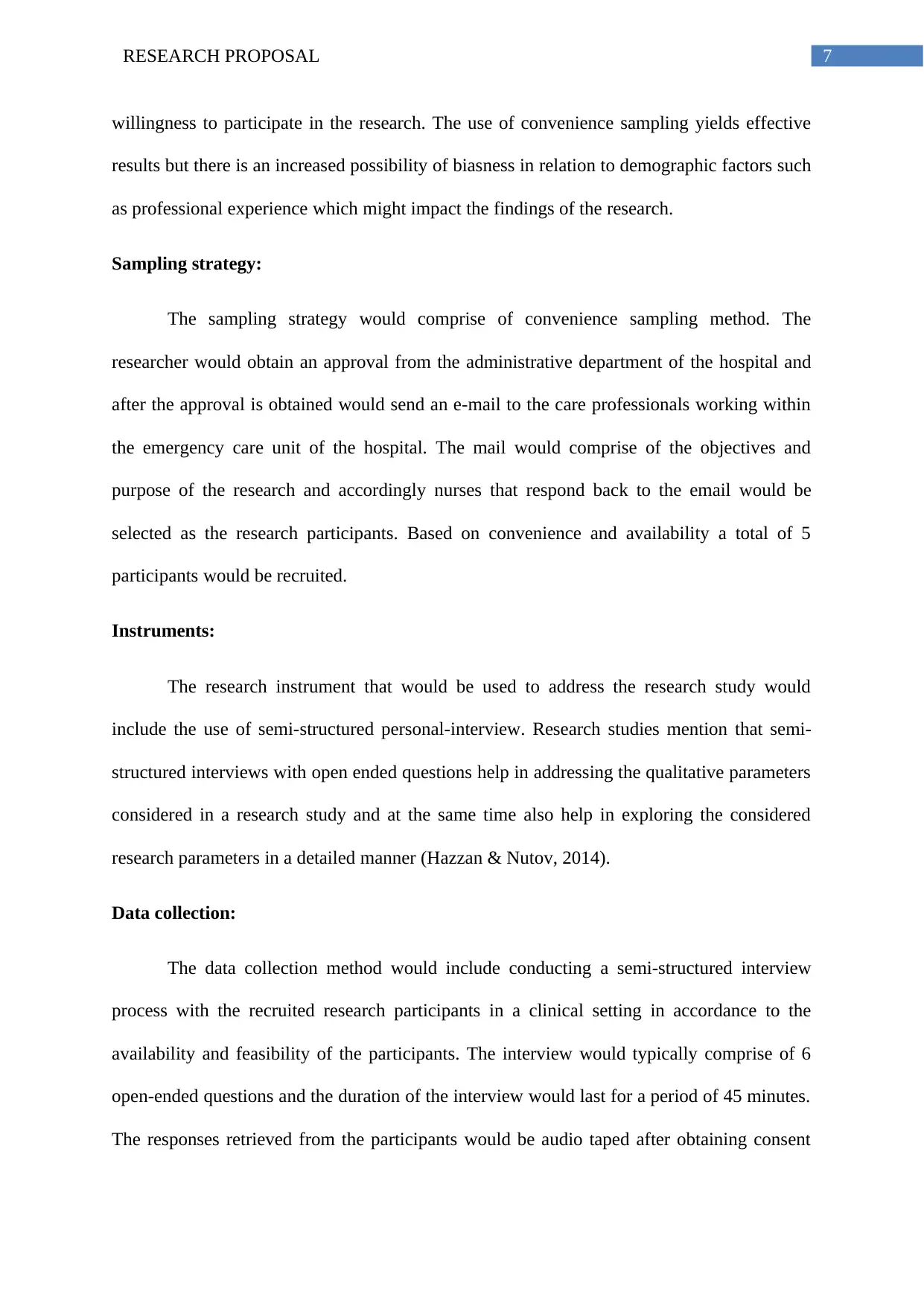
7RESEARCH PROPOSAL
willingness to participate in the research. The use of convenience sampling yields effective
results but there is an increased possibility of biasness in relation to demographic factors such
as professional experience which might impact the findings of the research.
Sampling strategy:
The sampling strategy would comprise of convenience sampling method. The
researcher would obtain an approval from the administrative department of the hospital and
after the approval is obtained would send an e-mail to the care professionals working within
the emergency care unit of the hospital. The mail would comprise of the objectives and
purpose of the research and accordingly nurses that respond back to the email would be
selected as the research participants. Based on convenience and availability a total of 5
participants would be recruited.
Instruments:
The research instrument that would be used to address the research study would
include the use of semi-structured personal-interview. Research studies mention that semi-
structured interviews with open ended questions help in addressing the qualitative parameters
considered in a research study and at the same time also help in exploring the considered
research parameters in a detailed manner (Hazzan & Nutov, 2014).
Data collection:
The data collection method would include conducting a semi-structured interview
process with the recruited research participants in a clinical setting in accordance to the
availability and feasibility of the participants. The interview would typically comprise of 6
open-ended questions and the duration of the interview would last for a period of 45 minutes.
The responses retrieved from the participants would be audio taped after obtaining consent
willingness to participate in the research. The use of convenience sampling yields effective
results but there is an increased possibility of biasness in relation to demographic factors such
as professional experience which might impact the findings of the research.
Sampling strategy:
The sampling strategy would comprise of convenience sampling method. The
researcher would obtain an approval from the administrative department of the hospital and
after the approval is obtained would send an e-mail to the care professionals working within
the emergency care unit of the hospital. The mail would comprise of the objectives and
purpose of the research and accordingly nurses that respond back to the email would be
selected as the research participants. Based on convenience and availability a total of 5
participants would be recruited.
Instruments:
The research instrument that would be used to address the research study would
include the use of semi-structured personal-interview. Research studies mention that semi-
structured interviews with open ended questions help in addressing the qualitative parameters
considered in a research study and at the same time also help in exploring the considered
research parameters in a detailed manner (Hazzan & Nutov, 2014).
Data collection:
The data collection method would include conducting a semi-structured interview
process with the recruited research participants in a clinical setting in accordance to the
availability and feasibility of the participants. The interview would typically comprise of 6
open-ended questions and the duration of the interview would last for a period of 45 minutes.
The responses retrieved from the participants would be audio taped after obtaining consent
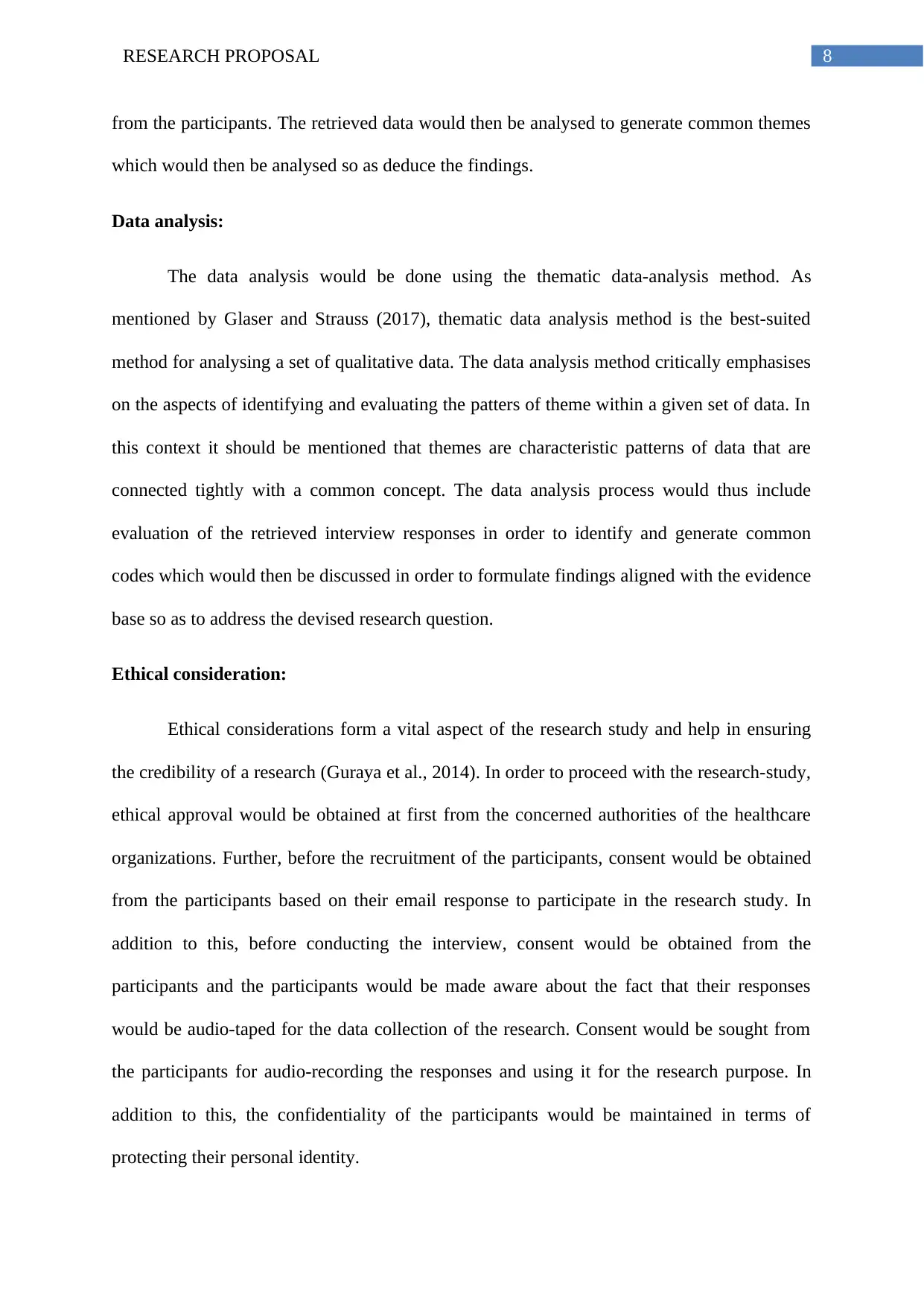
8RESEARCH PROPOSAL
from the participants. The retrieved data would then be analysed to generate common themes
which would then be analysed so as deduce the findings.
Data analysis:
The data analysis would be done using the thematic data-analysis method. As
mentioned by Glaser and Strauss (2017), thematic data analysis method is the best-suited
method for analysing a set of qualitative data. The data analysis method critically emphasises
on the aspects of identifying and evaluating the patters of theme within a given set of data. In
this context it should be mentioned that themes are characteristic patterns of data that are
connected tightly with a common concept. The data analysis process would thus include
evaluation of the retrieved interview responses in order to identify and generate common
codes which would then be discussed in order to formulate findings aligned with the evidence
base so as to address the devised research question.
Ethical consideration:
Ethical considerations form a vital aspect of the research study and help in ensuring
the credibility of a research (Guraya et al., 2014). In order to proceed with the research-study,
ethical approval would be obtained at first from the concerned authorities of the healthcare
organizations. Further, before the recruitment of the participants, consent would be obtained
from the participants based on their email response to participate in the research study. In
addition to this, before conducting the interview, consent would be obtained from the
participants and the participants would be made aware about the fact that their responses
would be audio-taped for the data collection of the research. Consent would be sought from
the participants for audio-recording the responses and using it for the research purpose. In
addition to this, the confidentiality of the participants would be maintained in terms of
protecting their personal identity.
from the participants. The retrieved data would then be analysed to generate common themes
which would then be analysed so as deduce the findings.
Data analysis:
The data analysis would be done using the thematic data-analysis method. As
mentioned by Glaser and Strauss (2017), thematic data analysis method is the best-suited
method for analysing a set of qualitative data. The data analysis method critically emphasises
on the aspects of identifying and evaluating the patters of theme within a given set of data. In
this context it should be mentioned that themes are characteristic patterns of data that are
connected tightly with a common concept. The data analysis process would thus include
evaluation of the retrieved interview responses in order to identify and generate common
codes which would then be discussed in order to formulate findings aligned with the evidence
base so as to address the devised research question.
Ethical consideration:
Ethical considerations form a vital aspect of the research study and help in ensuring
the credibility of a research (Guraya et al., 2014). In order to proceed with the research-study,
ethical approval would be obtained at first from the concerned authorities of the healthcare
organizations. Further, before the recruitment of the participants, consent would be obtained
from the participants based on their email response to participate in the research study. In
addition to this, before conducting the interview, consent would be obtained from the
participants and the participants would be made aware about the fact that their responses
would be audio-taped for the data collection of the research. Consent would be sought from
the participants for audio-recording the responses and using it for the research purpose. In
addition to this, the confidentiality of the participants would be maintained in terms of
protecting their personal identity.
⊘ This is a preview!⊘
Do you want full access?
Subscribe today to unlock all pages.

Trusted by 1+ million students worldwide
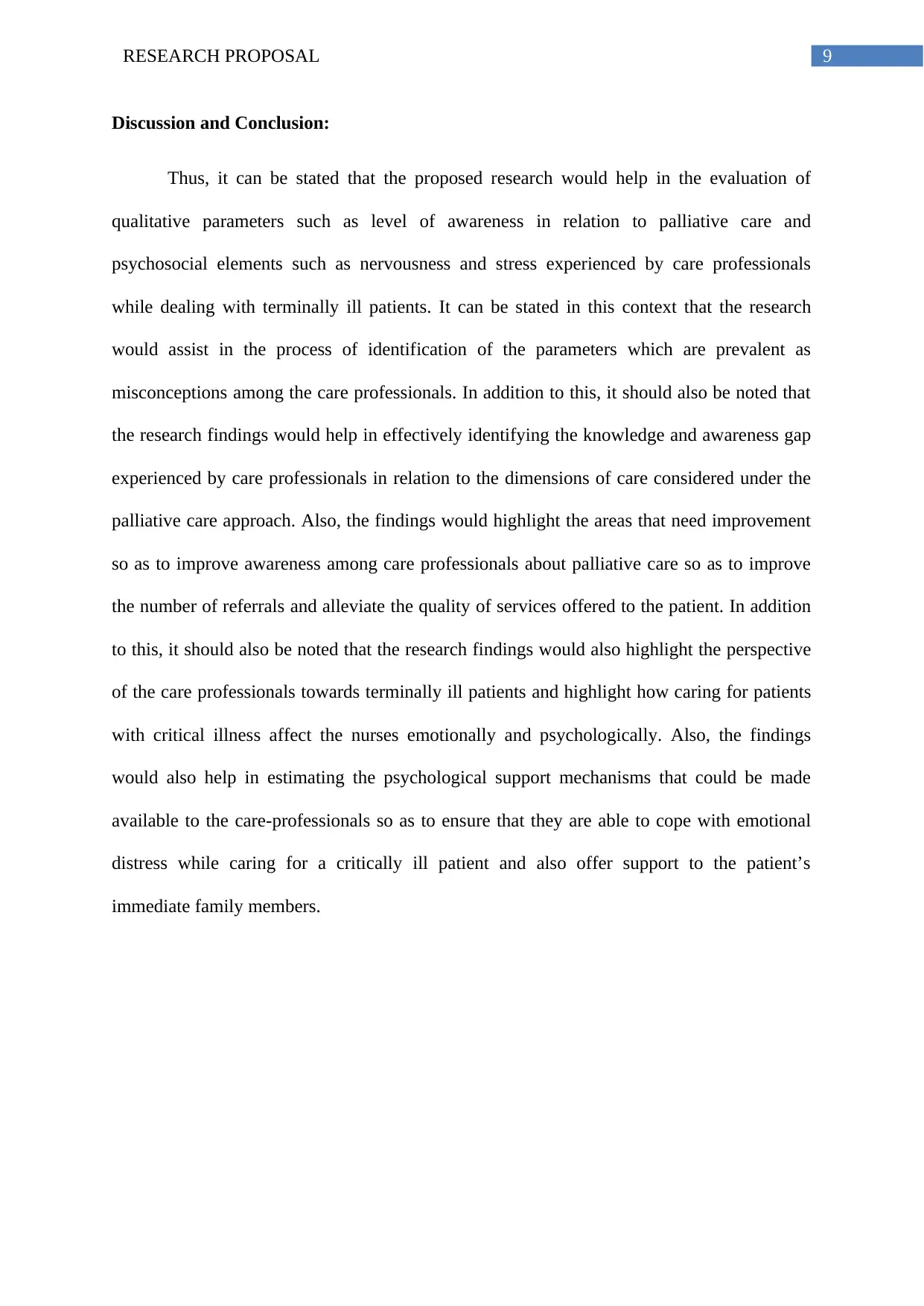
9RESEARCH PROPOSAL
Discussion and Conclusion:
Thus, it can be stated that the proposed research would help in the evaluation of
qualitative parameters such as level of awareness in relation to palliative care and
psychosocial elements such as nervousness and stress experienced by care professionals
while dealing with terminally ill patients. It can be stated in this context that the research
would assist in the process of identification of the parameters which are prevalent as
misconceptions among the care professionals. In addition to this, it should also be noted that
the research findings would help in effectively identifying the knowledge and awareness gap
experienced by care professionals in relation to the dimensions of care considered under the
palliative care approach. Also, the findings would highlight the areas that need improvement
so as to improve awareness among care professionals about palliative care so as to improve
the number of referrals and alleviate the quality of services offered to the patient. In addition
to this, it should also be noted that the research findings would also highlight the perspective
of the care professionals towards terminally ill patients and highlight how caring for patients
with critical illness affect the nurses emotionally and psychologically. Also, the findings
would also help in estimating the psychological support mechanisms that could be made
available to the care-professionals so as to ensure that they are able to cope with emotional
distress while caring for a critically ill patient and also offer support to the patient’s
immediate family members.
Discussion and Conclusion:
Thus, it can be stated that the proposed research would help in the evaluation of
qualitative parameters such as level of awareness in relation to palliative care and
psychosocial elements such as nervousness and stress experienced by care professionals
while dealing with terminally ill patients. It can be stated in this context that the research
would assist in the process of identification of the parameters which are prevalent as
misconceptions among the care professionals. In addition to this, it should also be noted that
the research findings would help in effectively identifying the knowledge and awareness gap
experienced by care professionals in relation to the dimensions of care considered under the
palliative care approach. Also, the findings would highlight the areas that need improvement
so as to improve awareness among care professionals about palliative care so as to improve
the number of referrals and alleviate the quality of services offered to the patient. In addition
to this, it should also be noted that the research findings would also highlight the perspective
of the care professionals towards terminally ill patients and highlight how caring for patients
with critical illness affect the nurses emotionally and psychologically. Also, the findings
would also help in estimating the psychological support mechanisms that could be made
available to the care-professionals so as to ensure that they are able to cope with emotional
distress while caring for a critically ill patient and also offer support to the patient’s
immediate family members.
Paraphrase This Document
Need a fresh take? Get an instant paraphrase of this document with our AI Paraphraser
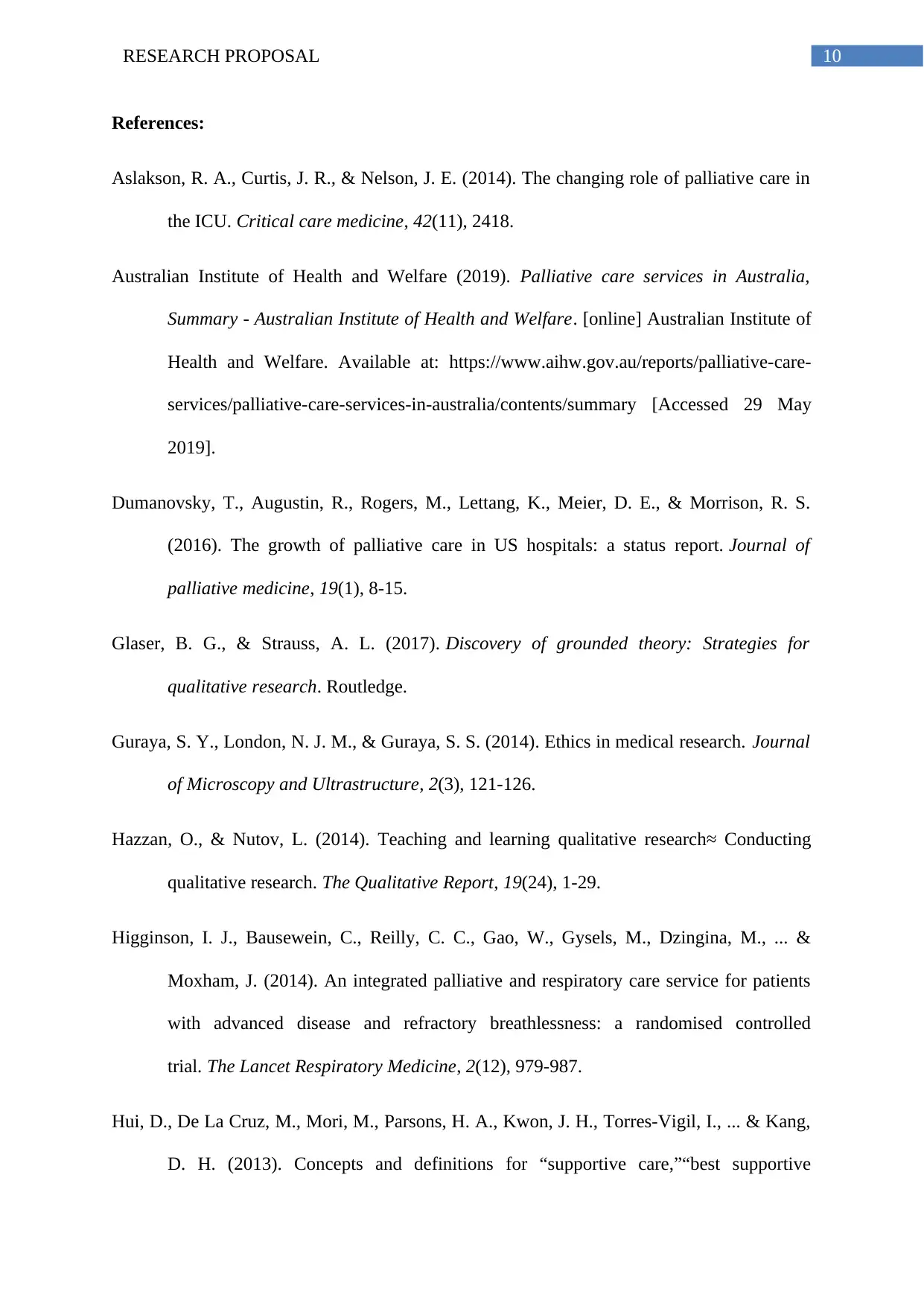
10RESEARCH PROPOSAL
References:
Aslakson, R. A., Curtis, J. R., & Nelson, J. E. (2014). The changing role of palliative care in
the ICU. Critical care medicine, 42(11), 2418.
Australian Institute of Health and Welfare (2019). Palliative care services in Australia,
Summary - Australian Institute of Health and Welfare. [online] Australian Institute of
Health and Welfare. Available at: https://www.aihw.gov.au/reports/palliative-care-
services/palliative-care-services-in-australia/contents/summary [Accessed 29 May
2019].
Dumanovsky, T., Augustin, R., Rogers, M., Lettang, K., Meier, D. E., & Morrison, R. S.
(2016). The growth of palliative care in US hospitals: a status report. Journal of
palliative medicine, 19(1), 8-15.
Glaser, B. G., & Strauss, A. L. (2017). Discovery of grounded theory: Strategies for
qualitative research. Routledge.
Guraya, S. Y., London, N. J. M., & Guraya, S. S. (2014). Ethics in medical research. Journal
of Microscopy and Ultrastructure, 2(3), 121-126.
Hazzan, O., & Nutov, L. (2014). Teaching and learning qualitative research≈ Conducting
qualitative research. The Qualitative Report, 19(24), 1-29.
Higginson, I. J., Bausewein, C., Reilly, C. C., Gao, W., Gysels, M., Dzingina, M., ... &
Moxham, J. (2014). An integrated palliative and respiratory care service for patients
with advanced disease and refractory breathlessness: a randomised controlled
trial. The Lancet Respiratory Medicine, 2(12), 979-987.
Hui, D., De La Cruz, M., Mori, M., Parsons, H. A., Kwon, J. H., Torres-Vigil, I., ... & Kang,
D. H. (2013). Concepts and definitions for “supportive care,”“best supportive
References:
Aslakson, R. A., Curtis, J. R., & Nelson, J. E. (2014). The changing role of palliative care in
the ICU. Critical care medicine, 42(11), 2418.
Australian Institute of Health and Welfare (2019). Palliative care services in Australia,
Summary - Australian Institute of Health and Welfare. [online] Australian Institute of
Health and Welfare. Available at: https://www.aihw.gov.au/reports/palliative-care-
services/palliative-care-services-in-australia/contents/summary [Accessed 29 May
2019].
Dumanovsky, T., Augustin, R., Rogers, M., Lettang, K., Meier, D. E., & Morrison, R. S.
(2016). The growth of palliative care in US hospitals: a status report. Journal of
palliative medicine, 19(1), 8-15.
Glaser, B. G., & Strauss, A. L. (2017). Discovery of grounded theory: Strategies for
qualitative research. Routledge.
Guraya, S. Y., London, N. J. M., & Guraya, S. S. (2014). Ethics in medical research. Journal
of Microscopy and Ultrastructure, 2(3), 121-126.
Hazzan, O., & Nutov, L. (2014). Teaching and learning qualitative research≈ Conducting
qualitative research. The Qualitative Report, 19(24), 1-29.
Higginson, I. J., Bausewein, C., Reilly, C. C., Gao, W., Gysels, M., Dzingina, M., ... &
Moxham, J. (2014). An integrated palliative and respiratory care service for patients
with advanced disease and refractory breathlessness: a randomised controlled
trial. The Lancet Respiratory Medicine, 2(12), 979-987.
Hui, D., De La Cruz, M., Mori, M., Parsons, H. A., Kwon, J. H., Torres-Vigil, I., ... & Kang,
D. H. (2013). Concepts and definitions for “supportive care,”“best supportive
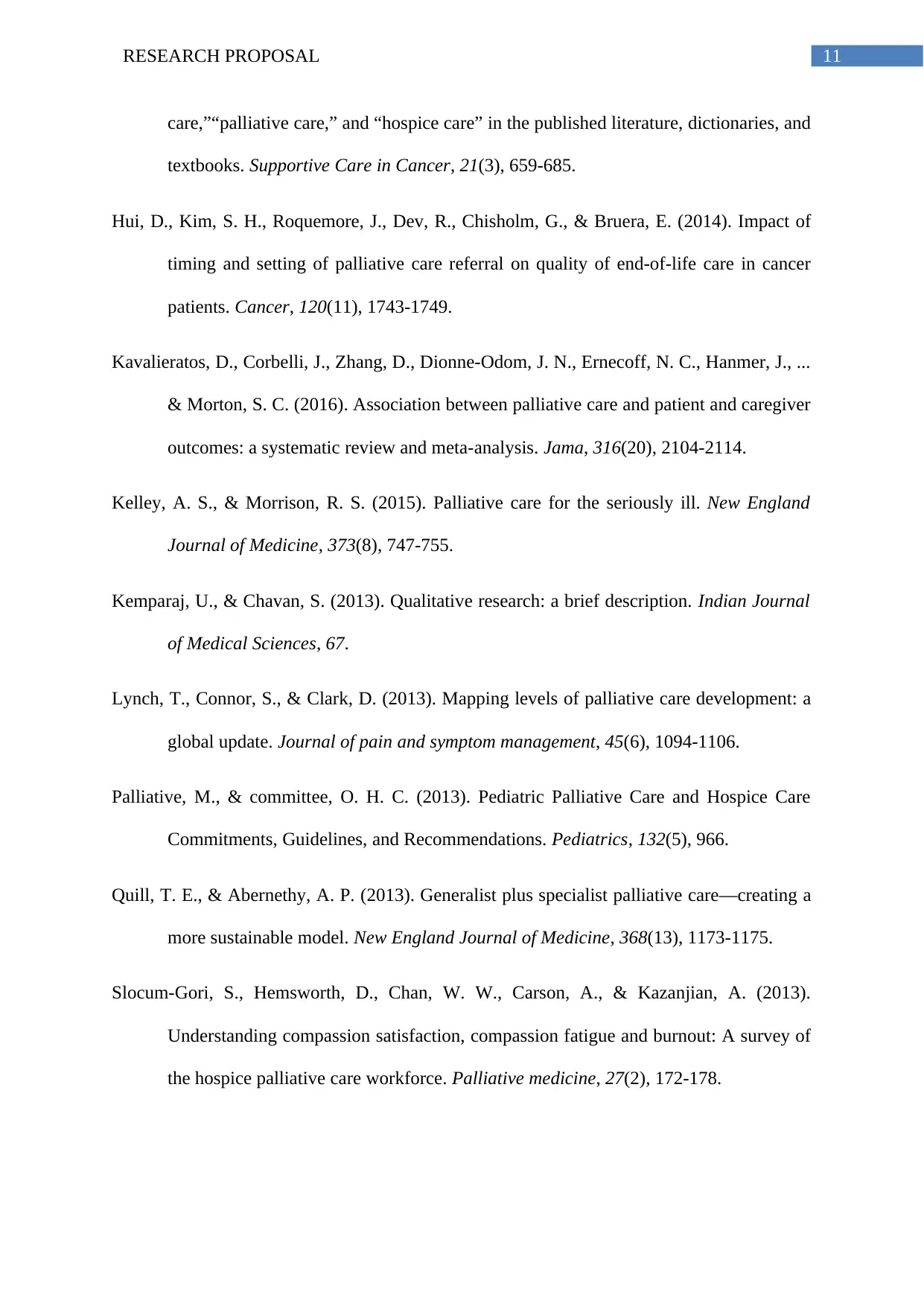
11RESEARCH PROPOSAL
care,”“palliative care,” and “hospice care” in the published literature, dictionaries, and
textbooks. Supportive Care in Cancer, 21(3), 659-685.
Hui, D., Kim, S. H., Roquemore, J., Dev, R., Chisholm, G., & Bruera, E. (2014). Impact of
timing and setting of palliative care referral on quality of end‐of‐life care in cancer
patients. Cancer, 120(11), 1743-1749.
Kavalieratos, D., Corbelli, J., Zhang, D., Dionne-Odom, J. N., Ernecoff, N. C., Hanmer, J., ...
& Morton, S. C. (2016). Association between palliative care and patient and caregiver
outcomes: a systematic review and meta-analysis. Jama, 316(20), 2104-2114.
Kelley, A. S., & Morrison, R. S. (2015). Palliative care for the seriously ill. New England
Journal of Medicine, 373(8), 747-755.
Kemparaj, U., & Chavan, S. (2013). Qualitative research: a brief description. Indian Journal
of Medical Sciences, 67.
Lynch, T., Connor, S., & Clark, D. (2013). Mapping levels of palliative care development: a
global update. Journal of pain and symptom management, 45(6), 1094-1106.
Palliative, M., & committee, O. H. C. (2013). Pediatric Palliative Care and Hospice Care
Commitments, Guidelines, and Recommendations. Pediatrics, 132(5), 966.
Quill, T. E., & Abernethy, A. P. (2013). Generalist plus specialist palliative care—creating a
more sustainable model. New England Journal of Medicine, 368(13), 1173-1175.
Slocum-Gori, S., Hemsworth, D., Chan, W. W., Carson, A., & Kazanjian, A. (2013).
Understanding compassion satisfaction, compassion fatigue and burnout: A survey of
the hospice palliative care workforce. Palliative medicine, 27(2), 172-178.
care,”“palliative care,” and “hospice care” in the published literature, dictionaries, and
textbooks. Supportive Care in Cancer, 21(3), 659-685.
Hui, D., Kim, S. H., Roquemore, J., Dev, R., Chisholm, G., & Bruera, E. (2014). Impact of
timing and setting of palliative care referral on quality of end‐of‐life care in cancer
patients. Cancer, 120(11), 1743-1749.
Kavalieratos, D., Corbelli, J., Zhang, D., Dionne-Odom, J. N., Ernecoff, N. C., Hanmer, J., ...
& Morton, S. C. (2016). Association between palliative care and patient and caregiver
outcomes: a systematic review and meta-analysis. Jama, 316(20), 2104-2114.
Kelley, A. S., & Morrison, R. S. (2015). Palliative care for the seriously ill. New England
Journal of Medicine, 373(8), 747-755.
Kemparaj, U., & Chavan, S. (2013). Qualitative research: a brief description. Indian Journal
of Medical Sciences, 67.
Lynch, T., Connor, S., & Clark, D. (2013). Mapping levels of palliative care development: a
global update. Journal of pain and symptom management, 45(6), 1094-1106.
Palliative, M., & committee, O. H. C. (2013). Pediatric Palliative Care and Hospice Care
Commitments, Guidelines, and Recommendations. Pediatrics, 132(5), 966.
Quill, T. E., & Abernethy, A. P. (2013). Generalist plus specialist palliative care—creating a
more sustainable model. New England Journal of Medicine, 368(13), 1173-1175.
Slocum-Gori, S., Hemsworth, D., Chan, W. W., Carson, A., & Kazanjian, A. (2013).
Understanding compassion satisfaction, compassion fatigue and burnout: A survey of
the hospice palliative care workforce. Palliative medicine, 27(2), 172-178.
⊘ This is a preview!⊘
Do you want full access?
Subscribe today to unlock all pages.

Trusted by 1+ million students worldwide
1 out of 13
Related Documents
Your All-in-One AI-Powered Toolkit for Academic Success.
+13062052269
info@desklib.com
Available 24*7 on WhatsApp / Email
![[object Object]](/_next/static/media/star-bottom.7253800d.svg)
Unlock your academic potential
Copyright © 2020–2026 A2Z Services. All Rights Reserved. Developed and managed by ZUCOL.





